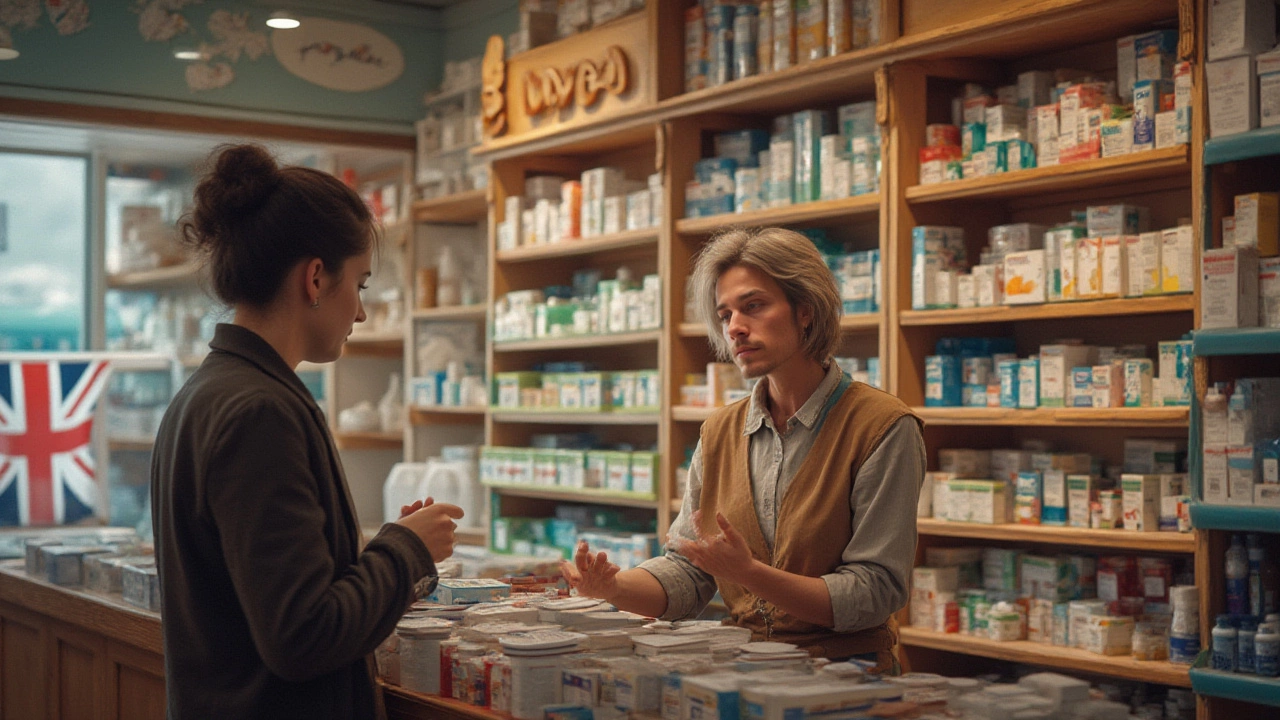 Jul, 4 2025
Jul, 4 2025
Antibiotics sound like magic pills, right? Catch a nasty infection, pop one, feel better in days. But here’s the shocking bit—if you head to your local pharmacy hoping to score something similar without a prescription, you’ll hit a wall. The world’s most effective antibiotics are locked safely behind the pharmacy counter, guarded by strict regulations. But that doesn’t stop people from searching for over the counter (OTC) options that supposedly “work like antibiotics.” With home remedies, natural cures, and supplements fueling endless online chatter, it’s easy to get lost in promises and confusion. So, what can you actually buy OTC, and do these things ever actually work?
Why Antibiotics Aren’t Sold Over the Counter
The pharmacy shelves are packed—pain relief, cold meds, allergy fixes, but if you look for an antibiotic, you’ll come up empty. That’s not accidental. Antibiotics aren’t your average medication. They target bacterial infections, like strep throat or urinary tract infections, by directly attacking the germs causing chaos in your body.
Ask any pharmacist, and you’ll hear the same reason: governments and health experts worldwide have spent years tightening the rules. Why? Because when antibiotics are misused or overused—even just a couple of times—it helps breed stronger, more stubborn bacteria that don’t respond to medicine anymore. That’s what we call antibiotic resistance, and it’s already becoming a serious global problem.
To paint the real picture: according to the Centers for Disease Control and Prevention (CDC), antibiotic-resistant infections kill more than 35,000 people in the United States each year. Letting everyone pick up antibiotics over the counter would turn up the heat on this crisis fast.
Plus, some infections aren’t even caused by bacteria. If you’ve got a nasty cough from a virus, like the common cold or flu, antibiotics won’t do a thing for you. The only thing the pills would be killing is your healthy gut bacteria. So, doctors want to be absolutely sure you actually need them before writing a script.
Here’s another fun fact: across most European countries, antibiotics without a prescription are illegal—Spain and Greece, once known for OTC access, cracked down years ago. Even in countries where they’re technically for sale without a prescription, regulatory agencies and the medical community are hustling to change that. Your pharmacist isn’t being stingy; they’re protecting public health.
The Truth About OTC “Antibiotic Alternatives”
With the rise of “natural health” and DIY medicine, it’s no wonder so many people want quick, easy fixes. But let’s get real: most products labeled as “natural antibiotics” or “antibacterial” at drugstores aren’t going to save you if you’re up against a true bacterial infection.
So what actually falls under the OTC umbrella for fighting infection? Products like Neosporin and Polysporin, but those are topical ointments—meant to dab on minor cuts, not swallow for a fever. They contain real antibiotics, but the formulas are designed for your skin, not your whole body.
If you’re browsing for supplements, here’s what you’ll probably see: garlic pills, colloidal silver, echinacea, oil of oregano, or manuka honey. The claims run wild: “proven to kill bacteria!”, “as effective as antibiotics!”. There are studies—mostly in lab dishes, not real living humans—showing these substances can slow or kill bacteria. For instance, raw garlic releases allicin, which has some proven antibacterial effects. Manuka honey, used on wounds, can speed up healing and inhibit certain bacteria. But comparing these to prescription antibiotics is like comparing a squirt gun to a firehose.
Echinacea, for example, has some weak evidence for preventing colds, but hasn’t been shown to kill bacteria in the body. Colloidal silver used to be promoted everywhere, but studies show it builds up in your tissues and can cause your skin to turn blue (yep, blue)—the FDA now warns against its use.
Even cranberry extract, often pushed for urinary tract infections, doesn’t kill bacteria directly. It helps some people by stopping bacteria from sticking to bladder walls, but it can’t replace an antibiotic when you’re fighting a real UTI.
Here’s a table breaking down what you’ll find vs. the real evidence:
| OTC Product | Claimed Use | Human Studies? | Risks |
|---|---|---|---|
| Manuka Honey | Wound healing | Some (Topical) | Safe on skin, not for deep/internal infections |
| Garlic Supplements | Cold prevention, infections | Weak evidence | May irritate stomach, thin blood |
| Colloidal Silver | Antibacterial | No | Blue skin, organ damage |
| Oil of Oregano | General antimicrobial | Very limited | Potential allergies, stomach upset |
| Topical Antibiotic Creams | Minor cut/wound | Yes (On skin only) | Can’t be taken internally |
The key takeaway? There’s nothing OTC that can cure a serious bacterial infection inside your body. For those, you need a real, prescribed antibiotic—no getting around it.

Home Remedies and When They Might (Sort Of) Help
All that being said, there are times when home or OTC remedies can help you feel better—or maybe even stave off an infection before it gets worse. Just don’t expect to walk away from strep throat or a raging sinus infection with nothing but tea and supplements.
For viral infections—the kind antibiotics don’t touch—you’re usually dealing with discomfort more than danger. Simple stuff like saline nasal sprays, throat lozenges, and extra fluids can help you bounce back faster. If you’ve got a scrape or burn, using antibiotic ointments on the surface can keep out bacteria and speed up healing. Clean the wound, use a thin layer, and cover with a fresh bandage.
If you get frequent UTIs, there’s a bit of encouraging research on cranberry products and D-mannose supplements. They seem to make it harder for bacteria to latch onto the bladder lining, which helps some people avoid getting sick as often. But once infection sets in—blood in urine, fever, burning—you need to see a doctor.
For sore throats, honey in tea (especially manuka honey) can soothe irritation and may help kill some bacteria in your mouth. It won’t treat the root infection, though. Gargling with salt water does help break up mucus and ease swelling, which might make you more comfortable, but don’t count on it to “kill” the underlying bug.
If you’re set on trying a supplement, think of it as back-up, not a primary weapon. Garlic, oregano oil, and even elderberry can nudge your immune system, but they aren’t replacements for antibiotics if you’re dealing with something serious. And with all supplements, check your source—look for brands with third-party testing, since potency can vary hugely.
What about probiotics? These “good germs” can definitely help restore your gut health after antibiotics, and there’s evidence they may lower your risk of catching colds or stomach bugs. But they won’t cure a bacterial infection already in progress.
If you ask people in online health forums, you’ll hear stories about people beating infections with apple cider vinegar, turmeric, or even coconut oil. While some of these have mild antibacterial properties in the lab, no major human trials have proven they work for real infections in living people.
Listen, if you just want to feel better and avoid unnecessary meds, great! But know the difference between minor illness (runny nose, sore throat, stiff muscles) and real danger signs (burning pee, pus, high fever, wheezing). If you’re in the second camp, don’t gamble with your health. That’s when you need professional care—no OTC pill or concoction compares to the real thing.
Smart Tips for Using OTC Products and Staying Healthy
Okay, so let’s talk about what you can actually do when it comes to antibiotics and OTC products—besides just waiting for a doctor’s appointment. The first thing to know is prevention: keeping yourself healthy (“an ounce of prevention is worth a pound of cure” and all that). Wash your hands, skip touching your face, and clean wounds right away. Sometimes, those old-school habits really do save you from bigger problems.
When you’re dealing with mild skin cuts or scrapes, it’s smart to clean them gently with soap and water—not hydrogen peroxide, which can burn healthy skin, despite the urban legends. After that, applying a thin layer of an OTC antibiotic ointment (think Neosporin or Bacitracin) can help avoid minor infections. Slap on a clean bandage and keep it dry.
If you feel a cold coming on, loading up on rest, fluids, and warm liquids is still your best friend. Throat lozenges can ease pain, especially those with a bit of menthol or honey. Some find that nasal saline sprays keep congestion under control, and humidifiers help prevent your nose and throat from drying out.
If you’re a supplement person, here are some quick things to consider:
- Always check for possible allergies or interactions. Garlic and oregano oil can thin blood, so skip them if you’re on certain meds.
- Never use colloidal silver, despite what some influencers say—it just isn’t safe.
- If you go for probiotics, pick refrigerated ones from trusted brands. Look for high colony counts and a blend of strains like Lactobacillus and Bifidobacterium.
- For cranberry extract, double check the dose. Some people get stomach upset if they overdo it.
The most important tip? Watch for red-flag symptoms. If you have a high fever, severe pain, pus, trouble breathing, confusion, or any symptoms that worsen fast, do not try to tough it out. Antibiotic resistance is real, but skipping real antibiotics when you need them is just as risky. Doctors are trained to spot the difference between a minor bug and something that needs antibiotics—lean on their expertise.
And just to drive it home: don’t share leftover antibiotics (huge problem), don’t buy medicine from sketchy online sources (counterfeits are out there), and don’t trust “miracle cures” with no science behind them. If anything sounds too good to be true, it probably is.
Stay curious, stay safe, and don’t be afraid to push your health questions. There’s a lot of noise out there about OTC antibiotic alternatives, but the truth? Most are helpful only for comfort, prevention, or very minor infections—a prescription is still the heavyweight champ when you’re really sick.
